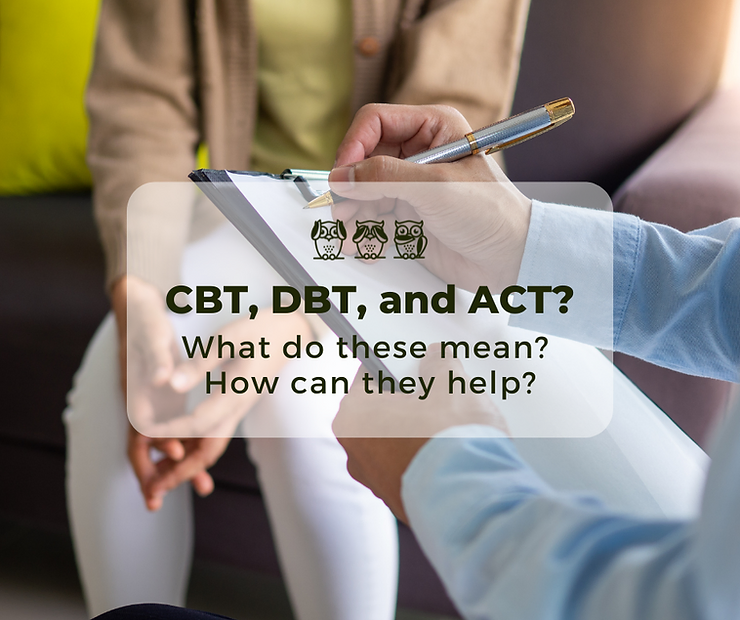CBT, DBT, and ACT? What do these mean? How can they help?
December 7th, 2022
Types of Behavioral Therapy for Mental Health
Here at psychological preventative health, we utilize evidence-based treatments to help you on your wellness journey.
Cognitive Behavioral Therapy (CBT), Dialectical Behavior Therapy (DBT), and Acceptance Commitment Therapy (ACT) are examples of those treatment modalities.
This guide will help break down the main elements of CBT, DBT, and ACT.
What is Cognitive Behavioral Therapy (CBT)
“People’s reactions always make sense once we know what they’re thinking” – Judith Beck
Cognitive Behavioral Therapy (CBT) is a treatment modality commonly used by mental health professionals. The premise behind CBT is the idea that psychological problems, or difficulty in mental wellness, might occur when a person has unhelpful ways of thinking that can lead to unhelpful patterns of behavior. The thoughts that occur may be in our awareness or they can occur subconsciously.
The goal of CBT is to identify negative core beliefs and automatic thoughts that interfere with our ability to function and find peace in everyday life and work towards a more positive self-image.

CBT is an ongoing process, so it does not end when the therapy session is complete. During the session, the client and therapist will work together to come up with ideas to help bring greater insight into the thoughts and feelings of the client throughout the week.
The client might journal, take notes about feelings and thoughts, read relevant books, and practice exercises that have been taught during the therapy session.
Who can benefit from CBT?
Cognitive Therapy has been found to be very effective in treating depression, anxiety disorders, obsessive-compulsive disorder, eating disorders, PTSD, and other mental illness.
What is Dialectical Behavior Therapy (DBT)?
“Emotions are not good, bad, right, or wrong. The first step to changing our relationship to feelings is to be curious about them and the messages they send to us.” – Lane Pederson
Dialectical Behavior Therapy (DBT) is another treatment modality used in psychotherapy in individual or group settings. In DBT, therapists help clients gain greater flexibility in their thinking through skills training.
This is accomplished by synthesizing opposites – and finding a middle ground. So, rather than looking at things as black and white, we can find the grey in between.
Other skills addressed in Dialectical Behavior Therapy (DBT), include acceptance, distress tolerance, and interpersonal skills.
The client and therapist plan together ideas and activities that will work towards their goals.
This might look like completing a diary card daily and reviewing and practicing skills learned.
This also allows the client and therapist to process skills used during the following session.
Who can benefit from DBT?
Dialectical Behavior Therapy (DBT) is helpful for anyone who becomes overwhelmed by intense feelings and emotions and also might engage in unwanted behaviors such as self-harming behavior, rage, anger, impulsive behavior, substance abuse, suicidality, or experiencing a lot of conflict in interpersonal relationships.
This technique is helpful for those suffering from depression, anxiety, PTSD, and especially those diagnosed with personality disorders such as borderline personality disorder.
What is Acceptance Commitment Therapy (ACT)?
“What you resist not only persists, but will grow in size.’’ – Carl Jung
Acceptance Commitment Therapy (ACT – and pronounced as the word act) is yet another psychotherapy modality utilized at Psychological Preventative Health.
Acceptance Commitment Therapy (ACT) works to allow people to move with all aspects of life, both the wonderful and the most difficult parts, by utilizing skills in mindfulness, goal orientation, and acceptance. In this treatment, acceptance is used to counteract avoidance.

While utilizing ACT, the therapist and client work together to identify personal values, goals, and practice re-directing your thoughts and behaviors to move towards your ideal.
A critical element to ACT is the application of skills discussed and practiced in between sessions. This may include journaling, worksheets, and other exercises to enhance the therapeutic learning experience.
Who can benefit from ACT?
ACT has been found to be effective in working with individuals who suffer from addiction, depression, anxiety, personality disorders, and other behaviors that increase difficulty in life.
We’re here to help guide you on your wellness journey
Our caring clinicians at Psychological Preventative Health can help provide thoughtful and gentle guidance through the difficulties of life.
If you have any questions regarding your mental health, please don’t hesitate to reach out to us. We would be more than happy to help you get the care, treatment, resources, and respect that you need and deserve. We look forward to serving you!



